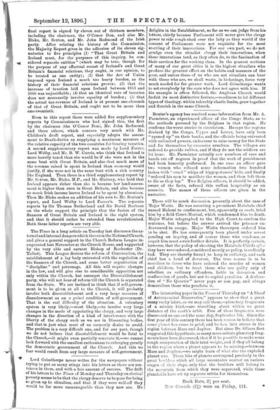Lord Grimthorpe never writes for the newpapers without trying to
put as many stings into his letters as there are sen- tences in them, and with a fair amount of success. The drift of his letters to the Times of Monday and Thursday on clerical poverty seems to be that the clergy deserve to be poor for being so given np to ritualism, and that if they were well-off they would be far more unmanageable than they now are. He delights in the Establishment, so far as we can judge from his letters, chiefly because Parliament will never give the clergy power to ride rough-shod over the laity as they would if the consent of Parliament were not requisite for the most startling of their innovations. For our own part, we do not grudge even the ritualist clergy their innovations, when those innovations tend, as they often do, to the fascination of their services for the working class. In the poorest sections of many of our great cities it is the highest ritualists who produce the greatest effect on the habits and manners of the poor, and unless those of us who are not ritualists can bear with those who are, we shall waste, in bickerings, force very much needed for far greater work. Lord Grimthorpe wants to set everybody by the ears who does not agree with him. If his example is often followed, the Anglican Church would forfeit its most distinctive feature,—readiness to let different types of theology, within tolerably elastic limits, grow together and flourish in the same Church.


































 Previous page
Previous page